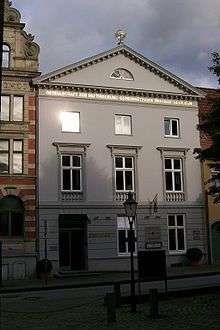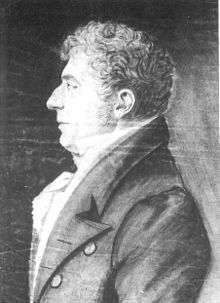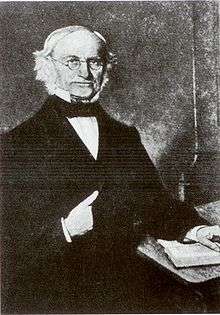Gesellschaft zur Beförderung gemeinnütziger Tätigkeit
The Gesellschaft zur Beförderung gemeinnütziger Tätigkeit ("Society for the Furtherance of Charitable Activities") is Lübeck's oldest charitable organization.

History
It was the preacher at St. Peter's Church, Lübeck (and later lawyer) Ludwig Suhl (1752–1819) and his friends Christian Adolph Overbeck, Johann Julius Walbaum, Anton Diedrich Gütschow, Gottlieb Nicolaus Stolterfoth, Johann Friedrich Petersen, and Nicolaus Heinrich Brehmer who, on 27 January 1789, founded this charity, first of all as a Literärische Gesellschaft ("literary society") with sidelines of scientific research and education; in 1791 the society's scope was broadened, and in 1793 it acquired the name it still bears today, although it is often abbreviated as the Gemeinnützige.
The democratically structured and middle class society and its social house (from 1826 at the address Breite Strasse 33, and from 1891 at Königstrasse 5) rapidly became the centre of practical reform work in the spirit of the Enlightenment. The company was involved in the improvement of conditions in many areas of life; for example, it established a River Lifesavers Institute. It was associated with the newspaper Neue Lübeckische Blätter and with the Jung-Lübeck, a Vormärz movement.
It ran the Sparkasse zu Lübeck, a credit union, and up to 1934 the Museum of Art and Cultural History. In 1938 their concert, theatre and lecture hall, the Kolosseum, was moved to the Kronsforder Allee.
On its hundredth anniversary in 1889 it received Lübeck's highest honour, the Gedenkmünze Bene Merenti. It is the only incorporated society to win this award. Eight former directors were given medals.
Present
The society has numerous subsidiary societies and unions, which contribute to the cultural and social life of the city. For example, it found a home for the St. Mary's Boys' Choir on the premises of the society in the Bürgergärten. As a trustee it manages a large number of dependent organisations, such as the Ferdinand Heinrich Grautoff-Stiftung.
Directors of the society
| Name | Incumbency | Ratslinie | Notes | Portrait |
|---|---|---|---|---|
| Ludwig Suhl (1752–1819) | 1789–1790 | Founder; archdeacon at St. Peter's Church, Lübeck, founded the society at his home Großen Petersgrube 27, today part of the Musikhochschule ("Music High School") |  | |
| Christian Adolph Overbeck(1755–1821) | 1791 | 949 | Supreme Court procurator |  |
| Adolph Friedrich Dehns(1740–1806) | 1792 | Senate secretary; son of the preacher at St. Giles's Church, Lübeck, Johann Balthasar Dehns, council secretary from 1769.[1] | ||
| **Ludwig Suhl | 1793 | Assessor of the cathedral chapter | ||
| **Christian Adolph Overbeck | 1794–1797 | 949 | Second General Counsel of the chapter | |
| Gottlieb Nicolaus Stolterfoht(1763–1806) | 1798–1801 | Last preacher at the Burgkloster, and according to the Lübecker Adressbuch for 1798 also a preacher at the Heiligen-Geist-Hospital and the Pockenhaus. During the French invasion, the Battle of Lübeck, he was mortally wounded by a bullet in the hallway of his home. | ||
| Anton Diedrich Gütschow | 1802–1803 | Counsel |  | |
| ***Ludwig Suhl | 1804–1808 | Titular assessor | ||
| Johann Friedrich Petersen(1760–1845) | 1808–1814 | Cathedral preacher. First recipient of the Gedenkmünze Bene Merenti (1835).[2] | ||
| Nicolaus Heinrich Brehmer(1765–1822) | 1814–1818 | Doctor, father of the senator and Burgomaster Heinrich Brehmer | ||
| ****Ludwig Suhl (died 1819) | 1818–1819 | Dr. jur., lawyer, titular assessor | ||
| **Nicolaus Heinrich Brehmer | 1819–1821 | Doctor | ||
| Bernhard Heinrich von der Hude | 1821–1825 | Pastor, St. Mary's Church, Lübeck | ||
| Johann Friedrich Hach | 1825–1830 | 955 | Supreme Court of Appeal, recipient of the Gedenkmünze Bene Merenti (1850) |  |
| Christian Gerhard Overbeck(1784–1846) | 1830–1833 | Supreme Court of Appeal, member of Jung-Lübeck movement | ||
| **Johann Friedrich Hach | 1833–1836 | Supreme Court of Appeal | ||
| **Christian Gerhard Overbeck | 1836–1839 | Supreme Court of Appeal | ||
| Heinrich von der Hude1798–1853 | 1839–1842 | Supreme Court of Appeal procurator, also at the regional court and the Lower Court. In 1844 the third councillor and in 1852 senator | ||
| Friedrich Boldemann(1788–1865) | 1842–1845 | Underwriting agent, Schonenfahrer and Citizen | ||
| Johann Heinrich Behn | 1845–1848 | Actuary | ||
| Johannes Classen | 1848–1851 | Professor at the Katharineum |  | |
| Hermann Wilhelm Hach(1800–1867) | 1851–1854 | 992 | Senator, son of the senator Johann Friedrich Hach. | |
| Georg Friedrich Ludwig Oppenheimer | 1854–1856 | Supreme Court of Appeal councillor | ||
| Karl Martin Joachim Klug | 1856–1859 | Pastor at St. Jacob's Church, Lübeck | ||
| Friedrich Wilhelm Mantels | 1859–1862 | Professor at the Katharineum, former member of Jung-Lübeck movement | ||
| Wilhelm von Bippen (Arzt) († 1865) | 1862–1865 | Practising physician | ||
| Heinrich Gustav Plitt | 1865–1868 | 1002 | Director of the Lower Court, from 1868 senator | |
| Wilhelm Brehmer | 1868–1871 | 1005 | Lawyer, from 1870 senator, recipient of the Gedenkmünze Bene Merenti (1901) | |
| Carl Alexander von Duhn | 1871–1874 | Member of the Supreme Court, former member of the Jung-Lübeck movement | ||
| Friedrich Adolph Hach(1832–1896) | 1874–1877 | Actuary for the Police | ||
| August Heinrich Sartori | 1877–1889 | Teacher at the Katharineum, from 1880 professor | ||
| Heinrich Klug | 1886–1889 | 1012 | Senator, recipient of the Gedenkmünze Bene Merenti (1904) | |
| Johann Georg Eschenburg | 1883–1886 | 1017 | Senate secretary, from 1885 senator, recipient of the Gedenkmünze Bene Merenti (1910) | |
| **Heinrich Klug | 1886–1889 | 1012 | Senator | |
| Ernst Christian Johannes Schön | 1889–1892 | 1022 | Public prosecutor | |
| Adolf Brehmer | 1892–1895 | Lawyer | ||
| Emil Ferdinand Fehling | 1895–1898 | 1023 | Lawyer, from 1896 senator, recipient of the Gedenkmünze Bene Merenti (1917) | |
| Johannes Daniel Benda | 1898–1901 | District court judge, from 1901 public prosecutor, recipient of the Gedenkmünze Bene Merenti (1919) | ||
| Ernst Julius Ludwig Müller | 1901–1904 | Director of the Johanneum | ||
| **Ernst Christian Johannes Schön | 1904–1907 | 1022 | Senator | |
| Johann Martin Andreas Neumann | 1907–1910 | 1029 | Senator | |
| Karl Friedrich Robert Dimpker | 1910–1913 | 1037 | Counsel and praeses of the Board of Trade | |
| Christian Reuter | 1913–1915 | Director of the Katharineum | ||
| Cay Diedrich Lienau | 1915–1918 | 1034 | Senator | |
| Johann Hermann Friedrich Evers | 1918–1921 | Pastor of St. Mary's | ||
| Hermann Stodte | 1921–1924 | Direktor at the Johanneum | ||
| Rudolf Keibel | 1924–1927 | First Counsel of the Board of Trade | ||
| Adolf Ihde | 1927–1930 | born 1881 in Lübeck, died 1959 in Sierksdorf; lawyer and notary | ||
| Karl Utermarck | 1930–1933 | District court president | ||
| Hans Sellschopp | 1933–1938 | Merchant | ||
| Bernhard Otto Clausen | 1939–1945 | Leader in the NSDAP | ||
| **Adolf Ihde | 1945–1949 | Lawyer and notary | ||
| Wilhelm Kusche († 1951) | 1949–1951 | Director at the cathedral school | ||
| Rolf Sander | 1952–1958 | District court councillor | ||
| Gerhard Gaul | 1958–1961 | Lawyer and notary. Recipient of the Gedenkmünze Bene Merenti (1982) | ||
| Gerhard Schneider | 1961–1964 | Senator | ||
| **Rolf Sander | 1964–1966 | Judge at the district court | ||
| Werner Dalstein | 1967–1969 | Planning director | ||
| Julius Edelhoff | 1970–1972 | Chief medical director | ||
| Gerhard Lund | 1973–1975 | Lawyer and notary | ||
| Christoph Deecke | 1976–1978 | Architect | ||
| Boto Kusserow | 1979–1984 | Lawyer and notary | ||
| **Christoph Deecke (1924–2004) | 1985 | Architect | ||
| Hans-Helmke Goosmann (b. 1927) | 1991–1996 | Architect | ||
| Renate Menken (b. 1943) | 1997–2002 | Pharmacist | ||
| Helmut Wischmeyer (b. 1935) | 2003–2005 | Property developer | ||
| Antje Peters-Hirt (b. 1953) | 2006–2011 | Germanist | ||
Note. The term of office is three years; immediately following terms are not specifically highlighted in the table, but can be deduced. Additional terms of office, after the term of a different incumbent, are marked by asterisks, so ** indicates a second additional period, and *** indicates a third. The Ratslinie number gives the position in the official register of 1925, Emil Ferdinand Fehling's Ratslinie.
See also
Bibliography
- Friedrich Bruns: Die Lübecker Syndiker und Ratssekretäre bis zur Verfassungsänderung von 1851 in: ZVLGA Band 29 (1938), S. 91 – 168.
- Hermann Stodte: Festschrift zur 150-Jahr-Feier der Gesellschaft zur Beförderung gemeinnütziger Tätigkeit zu Lübeck, begründet 1789. Lübeck 1939.
- Georg Behrens, 175 Jahre Gemeinnütziges Wirken, Lübeck 1964
- Ahasver von Brandt: Das Lübecker Bürgertum zur Zeit der Gründung der "Gemeinnützigen" – Menschen, Ideen und soziale Verhältnisse. In: Der Wagen 1966, S. 18–33.
- Emil Ferdinand Fehling, Lübeckische Ratslinie, Lübeck 1925.
- Vorsteherschaft der Gesellschaft (Hrsg.), 200 Jahre Gesellschaft zur Beförderung gemeinnütziger Tätigkeit in Lübeck 1789–1989, Lübeck 1989
Notes
- Friedrich Bruns: Die Lübecker Syndiker und Ratssekretäre bis zur Verfassungsänderung von 1851. In: ZVLGA Band 29 (1938), S.91 (163ff.).
- Ahasver von Brandt: Bene Merenti – Ein Lübisches Ehrenzeichen, seine Geschichte und seine Inhaber in: Der Wagen 1958, S. 58–64
External links
| Wikimedia Commons has media related to Gesellschaft zur Beförderung gemeinnütziger Tätigkeit. |